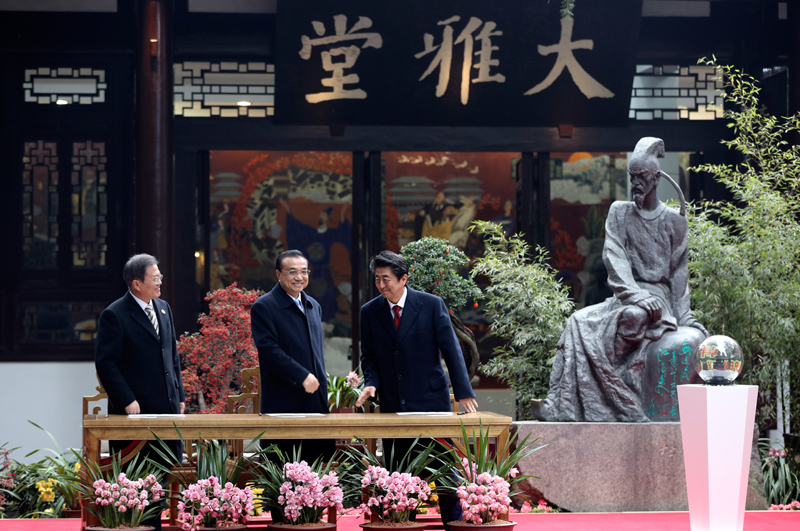Editor's note: Xu Chuanbo is a postdoctoral researcher at the Institute of Areas Studies at Peking University. The article reflects the author's opinions, and not necessarily the views of CGTN.
During the eighth China-Japan-Republic of Korea (ROK) leaders' meeting, Premier Li Keqiang met with Japanese Prime Minister Shinzo Abe and ROK President Moon Jae-in to hold negotiations on a broad range of issues, including economy and trade. This meeting has received more attention than the previous one. To the outside world, this meeting is held at a sensitive time, and the stakes are very high. Simply put, the key lies in how to find a way to cooperate in today's antagonistic atmosphere.
Friction and competition
Compared to the previous years, 2019 has been "eventful." It's marked by the outbreak of trade friction between Japan and the ROK. In March, an ROK court approved the seizure of assets from Mitsubishi Heavy Industries. In reaction, the Japanese government imposed restrictions on three semiconductor chemicals exported to the ROK in July, and even removed the ROK from its white list. Since then, the two countries have refused to give way to each other. The conflict escalated.
Unlike the trade friction between Japan and the ROK, the competition between China and the United States is centered around trade and technology. Since early this year, the Trump administration has launched multiple rounds of tariff offensives against China and attempted to contain China's 5G technology worldwide. China refuses to yield, and resorted to countermeasures against the United States.
In the meantime, the U.S. also put a target on the back of its "allies" such as Japan and the ROK. It has raised tariffs many times on Japan and the ROK and initiated trade investigations in an attempt to weaken the competitiveness of Japanese and ROK products in the U.S. market.
Reconciliation and cooperation
Despite all the friction and competition worldwide, reconciliation and cooperation are in the making.

Chinese Premier Li Keqiang (C), Japanese Prime Minister Shinzo Abe (R) and ROK President Moon Jae-in commemorate the 20th anniversary of trilateral cooperation in Chengdu, Sichuan Province, China, on December 24, 2019. /Photo via www.gov.cn
Chinese Premier Li Keqiang (C), Japanese Prime Minister Shinzo Abe (R) and ROK President Moon Jae-in commemorate the 20th anniversary of trilateral cooperation in Chengdu, Sichuan Province, China, on December 24, 2019. /Photo via www.gov.cn
After several rounds of back-and-forth, Japan and the ROK began to show signs of "truce." On December 20, the Japanese government decided to review the export control policies for semiconductor chemicals and extended the length of permits for inter-company transactions of certain chemicals from half a year to a maximum of three years. On December 24, it was reported that Prime Minister Abe had indicated to President Moon Jae-in that he hoped to improve Japan-ROK relations. Given the latest development, Japan and the ROK may embark on the path of reconciliation.
China and Japan, on the other hand, have grown closer in the past year. In May 2018, China and Japan signed the Memorandum on Business Cooperation in Third Countries. Since then, the two countries have grown closer in their cooperation in various fields.
It can be said that the above signs of reconciliation and the tendency in favor of cooperation make 2019 also a year full of "silver linings."
Challenges and opportunities
In fact, reconciliation and cooperation are the product of friction. It is precisely because of the offensives from the United States that China, Japan and the ROK have been brought closer.
The American unilateral sanctions have brought great challenges to China, Japan and the ROK, and have prompted the three countries to adopt measures of mutual reconciliation to varying degrees. At the same time, the Trump administration has turned away from the Obama administration's interventionist policy in East Asia. As we all know, the Obama administration pushed for the signing of the Trans-Pacific Partnership in an attempt to tear apart the framework of economic and trade cooperation between China, Japan, the ROK and even other East Asian countries. But the Trump administration has chosen to walk away from the table. This creates opportunities for China, Japan and the ROK to mend fences, remove the wedge and deepen cooperation with each other.
At present, China, Japan and the ROK are a community of shared interests and a community of shared future. Closing the differences and jointly promoting the negotiation on the China-Japan-ROK Free Trade Agreement and the RCEP Agreement will highlight the trio's determination to safeguard free trade and the multilateral trade system and give a strong rebuke to the regressive protectionist Trump administration. Such moves will set the stage for trilateral cooperation between the three countries and drive the process of economic integration between them, and even all of East Asia.
(If you want to contribute and have specific expertise, please contact us at opinions@cgtn.com.)